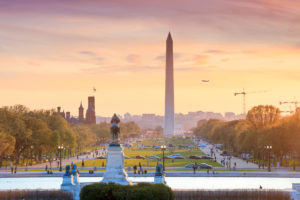
Congress passes another bill to aid in coronavirus impact relief, President Trump tightens immigration policies, and more…
IN THE NEWS
- The U.S. Senate and U.S. House of Representatives passed a $484 billion supplemental coronavirus relief bill that includes authorization of funds for small businesses, hospitals, and COVID-19 tests. The bill would add $320 billion to the small business Payment Protection Program, which exhausted its previous $349 billion funds in 13 days. Of the new funds, $60 billion would be allocated to smaller lending institutions to address concerns that the program was only accessible to business owners who had existing relationships with large banks. The bill would also allocate $75 billion for hospitals facing financial pressure from an influx of coronavirus patients and lost revenue from canceled elective procedures. It would also authorize $25 billion to develop and expand access to COVID-19 tests and would require the Trump Administration to establish a national strategy to increase testing. President Donald J. Trump has tweeted his support of the bill and is expected to sign it.
- Georgia Governor Brian P. Kemp authorized certain businesses to reopen this week, including gyms, fitness centers, and bowling alleys, among others. Republican senators, Trump Administration officials, health experts, and Georgia mayors pressured Governor Kemp to reconsider permitting businesses to reopen. Bo Dorough, Mayor of Albany, Georgia, reportedly said that “it is misguided for the Governor to prevent local governments from implementing measures to protect the health and safety of their citizens.”
- President Donald J. Trump issued a proclamation placing certain restrictions on immigration for 60 days. The proclamation will not apply to workers entering the United States on a temporary basis, immigrants who are already living in the country and seeking to become permanent legal residents, essential personnel, or spouses and underage children of U.S. citizens. President Trump claimed that the temporary ban would “help put unemployed Americans first in line for jobs as America reopens.” U.S. Representative Joaquin Castro (D-Texas), Chairman of the Congressional Hispanic Caucus, reportedly accused President Trump of using the proclamation as a “distraction and an opportunity to further his hard-line immigration policies.”
- The U.S. Food and Drug Administration (FDA) re-issued an Emergency Use Authorization letter for the first at-home COVID-19 diagnostic test after LabCorp submitted data it said demonstrated that at-home patient sample collection is as safe and accurate as sample collection at an official testing site. FDA Commissioner Stephen M. Hahn touted that “there is now a convenient and reliable option for patient sample collection from the comfort and safety of their home.” Sheldon Campbell, associate professor of laboratory medicine at the Yale School of Medicine, cautioned that the at-home test “is not a game-changer, but it is potentially another piece of the large and rather messy puzzle we are assembling to test enough people to stop COVID-19.”
- The U.S. Supreme Court released a decision that clarified that the definition of point source pollution discharge under the Clean Water Act includes some forms of groundwater pollution. The Clean Water Act forbids the discharge of pollutants into navigable waters without an appropriate permit. In a 6-3 majority opinion, Justice Stephen Breyer wrote that when pollutants are discharged to groundwater in a way that is the “functional equivalent” of discharge into navigable water, a permit is still required. The case was remanded to lower courts to determine if a Hawaii sewage treatment facility’s discharged pollution was in violation of the new standard.
- The U.S. Department of Agriculture announced a $19 billion Coronavirus Food Assistance Program, which will allocate $16 billion in direct support for farmers and ranchers who have experienced financial losses during the COVID-19 pandemic. The remaining $3 billion will be used to purchase fresh produce, dairy, and meat for nonprofit organizations serving Americans confronted with food scarcity. Zippy Duvall, president of the American Farm Bureau Federation, reportedly said that the program “will help keep food on Americans’ tables by providing a lifeline to farm families that were already hit by trade wars and severe weather.” Although this program is focused on domestic food assistance, a bipartisan group of senators also wrote a letter on the day of the announcement urging U.S. Secretary of State Mike Pompeo and U.S. Secretary of Agriculture Sonny Perdue to continue supporting international food assistance programs offered by the Department of Agriculture and the U.S. Agency for International Development.
- The Federal Communications Commission voted to accept new rules to mitigate orbital debris from satellites. Applicants for satellite spectrum licenses must now disclose numerical values for collision risk, casualty risk associated with re-entry to earth’s atmosphere, and satellite deployment and decommissioning plans. The agency also announced its plan to create a proposed rule that would establish stricter measures such as limiting the probability of accidental explosions, requiring maneuverability for space stations located above a certain altitude, and limiting post-mission orbital lifetime.
- The U.S. Trade Representative recently announced that it will remove the exclusion of two-sided solar panels from Section 201 tariffs. The exclusion was reportedly “undermining the objectives of the safeguard measure” to protect U.S. solar panel manufacturers from international competition. John Smirnow, general counsel for Solar Energy Industries Association, responded that the withdrawal would “needlessly increase the financial burden on America’s energy consumers.” The U.S. Trade Representative is expected to request that the U.S. Court of International Trade lift the preliminary injunction currently preventing the withdrawal. The Trump Administration’s previous attempt to withdraw the exclusion was blocked by the U.S. Court of International Trade because it was in the public interest to keep the exclusion while the issue was being litigated in other cases, the court explained. Judge Gary S. Katzmann, who prevented the previous withdrawal, reportedly said that opponents of the tariffs were likely to succeed.
- The Federal Communications Commission adopted new rules to expand the amount of mid-band spectrum allocated to Wi-Fi devices. The rule will allow consumer products to use the entire 6 gigahertz spectrum at low power indoors and at high power outdoors if equipped with an “automatic frequency control” system. The agency’s Chairman Ajit Pai argued that the new rules will increase the speed and capacity of consumer internet, while protecting existing critical infrastructure and broadcast actors who continue to license the 6 gigahertz spectrum.
WHAT WE’RE READING THIS WEEK
- In a National Bureau of Economic Research working paper, George Wehby, a professor at the University of Iowa, and his coauthors examined the effect of changes in minimum wage on child health. Using data from the National Survey of Children’s Health, Wehby and his coauthors found that an increase in state minimum wage rates during childhood was associated with a “large improvement in child health.” The relationship was particularly strong if the increase in minimum wage occurred before a child turned six, suggesting that parents were able to invest more of their income in their child’s development. Wehby and his coauthors argued that policymakers should consider consequences beyond labor market implications when determining whether an increase in minimum wage can improve the welfare of low-income households.
- In a forthcoming article in the Yale Journal on Regulation, Charles Silver of the University of Texas School of Law and David A. Hyman of the Georgetown University Law Center argued that a prize system would be more fair and more efficient than the current patent system for motivating research in the pharmaceutical industry. Silver and Hyman explained that public research grants often help private companies develop patentable drugs, potentially obscuring which company, if any, deserves credit for the invention. Silver and Hyman also criticized the incentives created by the patent system, arguing that they cause market inefficiencies and are misaligned with public health goals.
- In an op-ed in The Hill, Bernard L. Weinstein, associate editor of the Maguire Energy Institute and adjunct professor of business economics at the Southern Methodist University Cox School of Business, advocated an increase in the gas tax. Weinstein explained that the low price of gas and the lack of infrastructure funding in the first stimulus package make it an ideal time to raise the gas tax and collect revenue for the Highway Trust Fund.
FLASHBACK FRIDAY
- In a 2019 essay for The Regulatory Review, poet, public-interest attorney, and environmental activist Elizabeth J. Coleman advocated poetry as a tool to combat despair over climate change and as a force for optimism and activism. Coleman, discouraged by the effects of climate change and lack of global action, turned to poetry to “leave readers stirred, and ready to act…regardless of political affiliation.” In editing Here: Poems for the Planet, Coleman hoped to inspire a world “that relies on clean, renewable energy, that feeds people and nurtures the environment, and that protects vulnerable populations.”



